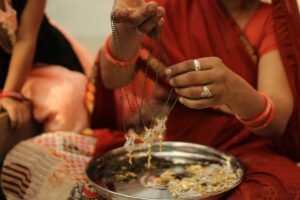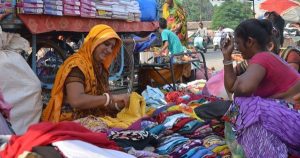by Smits
Waghri (also Vagri) is the name of a tribe and castle in India. They ride their horses from village to hamlet in pursuit of a living. Waghris are thought to have initially fled rural areas centuries ago when the Mughals targeted Hindus in an attempt to force them to change their religion. This was the moment when they hid in dense forests in the western state of Gujarat and adopted a nomadic living.
What is the meaning of Waghri?
Waghri word originally derived from sankrit word ‘Wagh’ (which means tiger) + ‘Ari’ (which means to hunt). Basically, Waghri means hunter of tiger or who are dexter in hunting.
The word Waghri itself has negative connotation In Gujarati and so members of the community consider both Waghri and Chindiwali as derogatory terms. They prefer to be referred to as Devipujaks (worshippers of the goddess) or Deviputras (children of the goddess). They are known for their deep devotion to female deities (Devis) such as Kali, Durga, or Meladi Mata, which is why they are called Devipujak or Deviputra.
Some sources associate them with the groups once classified as “criminal tribes” under British colonial rule though this label was abolished post-independence.

Photo by: Dishunee Pandya, www.pexels.com
Challenging Waghri Traditions
The Waghri tribe, like any other indigenous tribe, has its own set of rituals and traditions that community members adhere to religiously. When in front of any older male from their in-laws’ family, women’s heads must be covered with their saree as a sign of respect. Basic liberties such as marriage partner selection and schooling are still undertaken by the family’s men. When a girl begins her menstrual cycle, she is married off, which leads to early pregnancy and health risks. I am Waghri, and I will be among the first women in our community to achieve a university degree. After marriage, Waghri women wear Gujarati-style draped sarees, and the groom presents his bride with elephant trunk bangles, which distinguish Waghri women from others. The males, on the other hand, are dressed simply in shirts and pants.
King of tiger or recycling of old clothes?
Once considered a criminal tribe, the Waghris are now the kings of second-hand clothing. The recycling of old clothes, which are then sold at local markets, is the main source of income in Waghari community, although key-making and other minor jobs are also done by men.

Every week, a second-hand clothing market opens in Ahmedabad, India; thousands of low-income people gather here to buy second-hand clothes offered by the Waghris . The clothes would have ended up in the trash if they hadn’t been collected from homes by the Waghris .
This is just one of the many marketplaces across India where the clothes collected by the Waghris end up. You must have seen them in your own city too.
Waghri Festivals and Cultural Roots
The Waghris celebrate Hindu festivals such as Diwali, Holi, Navrati, etc. Each village worships the Goddess Durga in her different incarnations and offerings of meat are made on special occasions. Every year in the summer, those who have settled in cities pay a visit to their ancestral homeland.
The Waghri tribe is a close-knit minority that only travels Gujarat for religious reasons. With limited resources, leisure trips are out of the question. I hail from the Waghri community in Pune, Maharashtra, which has only existed in this city for a few decades. For the last 15 years, Ashraya Initiative for Children, a non-profit organisation located in Pune, has been supporting the Waghri community by providing education, health care, and nourishment. It was founded by a group of college girls who aspired to help street children in Pune have access to a better life. Ashraya Initiative for Children currently supports over 400 children in terms of educational training as well as ensuring sufficient nutrition and healthcare.
A Waghri Woman’s Journey Toward a Brighter Future
With AIC’s educational support, I was able to shape my destiny. Various volunteers came to the community centre to teach us from around the world. We conversed about their way of life, cuisine, and thus piqued my interest in visiting these destinations. I was thrilled to turn my love of travel into a career. With the encouragement of the community centre, the tribe is gradually integrating, leaving all superstitions behind. The importance of education is crucial. We Waghris will be able to travel for pleasure in the not-too-distant future.
AIC is doing everything it can to help these communities improve their lives, but there are still those who require assistance in getting access to school and basic healthcare. If you’re interested in donating, here’s a link to where you can do so.


This Post Has 0 Comments